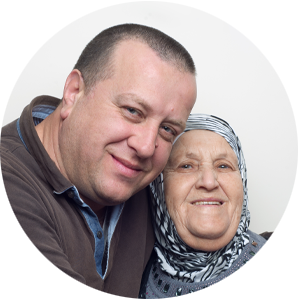What you need to know about getting retinal disorder treatment in Brooklyn and Manhattan
Are you suffering from a retinal disorder?
These challenges may sound familiar…


Your eyes aren’t functioning correctly
You have a retinal disorder which means your retina is unable to function correctly. Severe visual impairment and blindness is a possibility.
This can affect your mood
You’re likely feeling scared and helpless. Living with a myriad of ocular and visual symptoms might be having a negative impact on your emotional well-being.
And it can ruin your day
Your activity and social interaction might be limited. Simple things like reading, driving, shopping, using your computer and getting involved at social gatherings can be a constant challenge.
Enough is enough
It’s time to end the suffering and re-engage with life. With our range of treatments, we can stop disease progression and improve or restore your vision so that you can live a more fulfilling life.
Retinal disorders explained
In these toggles we explain what you need to know about retinal disorders
Retinal detachment
Retinal detachment is a severe eye condition which can cause severe or even permanent vision loss.
It can occur at any age, but it is more common in people over the age of 40.
Some common symptoms include:
- Spots
- Floaters
- Flashes of light
- Poor vision or a shadow appearance across the top of the eye
What are floaters?
Floaters are specks that move in and out of your field of vision. They may be more noticeable when looking at a plain background. Floaters are tiny clumps of cells inside the vitreous humor (the clear fluid that fills the inside of the eye) that can be different shapes.
Retinal vein occlusion
Retinal vein occlusion, also referred to as an eye stroke, is a common cause of sudden painless reduction in vision in older people.
Symptoms include:
- Blurry or distorted vision, typically in one eye
- You may not experience any symptoms at all
Retinal detachment
Retinal detachment occurs when the retina becomes separated from the underlying supportive tissues, which prevents it from functioning correctly.
Risk factors include:
- Aging
- Cataract surgery
- Thinning of the outer retina
- A high degree of nearsightedness
- Trauma
The three main variations of retinal detachment include:
- A tear or hole in the retina
- A tug on the retina
- Leaking blood cells behind the retina
Retinal vein occlusion
Retinal vein occlusion occurs when a vein draining blood from the eye gets blocked. The blockage of the vein means that blood cannot drain out of the retina. This leads to reduced vision.
Retinal vein occlusion usually occurs due to a blood clot that blocks the vein. In the retina, arteries and veins cross over each other. When an artery hardens, it can press against a vein and narrow the opening. This can cause irregular blood flow which may lead to clotting.
Risk factors include:
- High blood pressure
- High cholesterol
- Glaucoma
- Diabetes
- Smoking
- Certain rare blood disorders
Retinal detachment
We can diagnose retinal detachment by performing a comprehensive eye examination to assess your vision, and general eye health.
We will conduct the follwoing tests:
- Retinal examination
- Ultrasound imaging
Retinal vein occlusion
We can diagnose retinal vein occlusion with a comprehensive eye exam, including vision and pressure checks, and examining the surfaces and vessels of your eye.
Other tests to diagnose retinal vein occlusion include:
- Optical coherence tomography
- Ophthalmoscopy
- Fluorescein angiography
- We may also perform blood tests for diabetes, high cholesterol, and blood clotting disorders
Retinal detachment
If your retina has detached, you’ll need surgery to repair it. The type of surgery will depend on how severe the detachment is.
Suregry’s include:
- Injecting air or gas into your eye
- Indenting the surface of your eye
- Draining and replacing the fluid in the eye
Retinal tears
If your retina hasn’t yet progressed to detachment, it may present as a tear or a hole.
You may require one of the following procedures to prevent retinal detachment and preserve vision:
- Laser surgery (photocoagulation)
- Freezing (cryopexy)
Retinal vein occlusion
Depending on the severity of the damage to the blood supply, treatment includes:
- Laser treatment called panretinal photocoagulation
- Injections of drugs into the eye of which there are two main types:
– Steroid Implant – Ozurdex (Dexamethasone)
– Anti VEGF Agents – Lucentis (Ranibizumab), Eylea (Aflibercept), Avastin
Discover your options to get your eyes back in top shape
Call us and we’ll help you take the steps you need to repair your eyes
How to get help
These 3 easy steps allow you to stop worrying about your eyes
STEP 1:
Call us to get an appointment
Give us a call at (718) 630-1010 and we’ll answer the questions you have so that we can recommend the best next step.
STEP 2:
Visit us
Whatever the issue, we’ll provide you with the exceptional care that your most precious sense deserves.
STEP 3:
Get the help you need
Whether it’s a quick intervention or a long-term treatment plan, we’ll guide you with compassion, every step of the way.
Affiliations and memberships
We are proud to be associated with these professional organisations
Got diabetes? Learn how to avoid unnecessary blindness
Discover what you can do to reduce your risk of diabetic vision loss
What our patients say
★★★★★
We’ve been getting 5-star reviews from savvy Brooklynites and New Yorkers for over 20 years


Dr.Khosrof is one of the most knowledgeable doctors in his field. My family and I have been his patients for years and he has never failed to provide us tip top service and always does what’s safest for us and our eyes…


I want to talk about Dr. Samer, he is extremely professional and kind and he has the latest equipment and great staff. He’s very caring about his patients and takes the time to explain.


Dr. Khosrof is an outstanding physician and surgeon with a great bedside manner. As a fellow Ophthalmologist, I have always been impressed by his talent.


Dr. Khosrof improved my eye sight from 20/400 to 20/80. I had previously see 2 other retina specialists and 1 optometrist and none of them were able to help me. He’s terrific!
For more information about retinal disorders
Educate yourself further about retinal disorders by reading the links below
This article provides a great overview of all the different types of retinal disorders. Click here to read more.
This is a government website that provides a summary of retinal disorders. It also includes more links to specific information on symptoms, diagnosis, and more. Click here for more information.
Here is an article on retinal detachment, the symptoms and how to treat it. Click here for more information.
This multi-page synopsis of retinal detachment is helpful for anyone who would like to learn more about this condition. Click here to read more.
About the expert
Dr. Samer Khosrof | Ophthalmologist
Dr. Samer Khosrof is a top eye surgeon in New York City with over 25 years of experience treating complex eye conditions such as diabetic retinopathy and age-related eye conditions.
His extensive experience enables him to stay on top of the latest treatments available. He believes in the efficacy of medical technology and has the expertise to deploy the newest diagnostic and treatment techniques to treat his patients with 100% confidence.
When you become a New York Eye & Retina Clinic patient; you’re a Samer Khosrof patient first. This means he sees you before your surgery, he performs your surgery, and he provides your aftercare. In the end, you’re his patient, and he takes that responsibility very seriously.
































